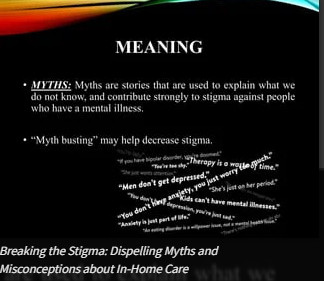Originally posted on: https://www.goldenhealthcenters.com/breaking-the-stigma-dispelling-myths-and-misconceptions-about-in-home-care/
In-home care, a service designed to support individuals in their own homes, is often shrouded in misconceptions and stigma. This essential service provides assistance ranging from personal care to medical treatment, enabling people to live independently and comfortably in their familiar surroundings. Despite its many benefits, in-home care is frequently misunderstood, with many people harboring outdated or incorrect views about who it is for and what it entails. This blog aims to dispel these myths and misconceptions, shedding light on the true nature and benefits of in-home care, and the diverse range of clients who utilize it.
The Stigma of In-Home Care
The stigma surrounding in-home care often stems from a lack of understanding and deep-rooted societal beliefs about dependency and aging. Many people associate in-home care solely with elderly care, overlooking its applicability to individuals of all ages with various needs. This stigma can prevent people from seeking the help they need, fearing judgment for not being able to manage on their own or for aging ‘gracelessly.’
In-Home Care Myths and Misconceptions
Myth 1: In-Home Care is Only for the Elderly
One of the most prevalent in-home care myths is that it is exclusively for senior citizens. While aging in place and elder care are significant focuses of in-home care, services are also available for people with disabilities, those recovering from surgery or illness, and individuals needing temporary assistance. In-home care supports a broad spectrum of needs, promoting independent living for anyone, regardless of age.
Myth 2: In-Home Care Takes Away Independence
Contrary to the belief that in-home assistance diminishes a person’s independence, it often enhances it. Caregivers provide the support needed for individuals to maintain their daily routines and activities, empowering them to live more independently than they might otherwise be able to. This support ranges from help with personal care and household tasks to medication management and mobility assistance.
Myth 3: In-Home Care is Too Expensive
Misconceptions about in-home care costs can deter people from considering this option. While costs vary based on the level and frequency of care required, in-home care can be a cost-effective alternative to residential care facilities. Many insurance plans, including Medicare and Medicaid, may cover certain in-home care services, making it an accessible option for a wide range of individuals.
Myth 4: All In-Home Care is the Same
In-home care encompasses a wide range of services tailored to meet individual needs. From home health care, which includes medical services provided by licensed professionals, to non-medical in-home assistance with daily activities, the care plan is customized to the client’s specific requirements. Understanding the types of services available can help individuals and families choose the right kind of support.
Benefits of In-Home Care
In-home care offers numerous benefits, not only for the individuals receiving care but also for their families. It allows people to age in place or recover in the comfort of their own homes, surrounded by familiar settings and memories. This familiarity can be particularly beneficial for individuals with dementia or other cognitive impairments. Moreover, in-home care provides personalized attention and care plans tailored to the individual’s specific needs, ensuring a higher level of care than might be possible in a group setting.
Who Uses In-Home Care?
In-home care serves a diverse clientele, including:
- Seniors preferring to age in place: For many elderly individuals, in-home care enables them to live independently in their own homes for as long as possible.
- People with disabilities: In-home care can support individuals with disabilities, offering assistance with daily activities and enabling them to lead fulfilling lives.
- Individuals recovering from surgery or illness: Home health care services support recovery and rehabilitation, providing medical care and assistance during the healing process.
- Families needing temporary assistance: Families dealing with illness or new parenthood often benefit from short-term in-home assistance to manage household tasks and care responsibilities.
Dispelling Myths About In-Home Care for Seniors
For seniors, the decision to enlist in-home care services is often fraught with concerns about losing their independence or being a burden to their families. Dispelling myths about in-home care for seniors is crucial in helping them understand that these services can enhance their quality of life, maintain their independence, and provide invaluable support for aging in place safely and comfortably.
Overcoming the Stigma of Needing In-Home Help
Overcoming the stigma begins with education and open conversations about the realities of in-home care. Highlighting the benefits and the diverse range of individuals who utilize these services can help change perceptions and encourage more people to consider in-home care as a viable and positive option.
Embracing In-Home Care: A Path to Independence and Quality of Life
In-home care is a valuable and necessary service for many individuals, offering the support needed to live independently and with dignity. By dispelling the myths and misconceptions surrounding in-home care, we can break down the stigma and open the door for more people to benefit from these services. Whether it’s aiding seniors in aging in place, supporting individuals with disabilities, or assisting families through challenging times, in-home care provides a flexible and personalized solution to meet the varied needs of its clients. It’s time to recognize in-home care for what it truly is: a lifeline for those wishing to maintain their independence and quality of life, regardless of their circumstances.




